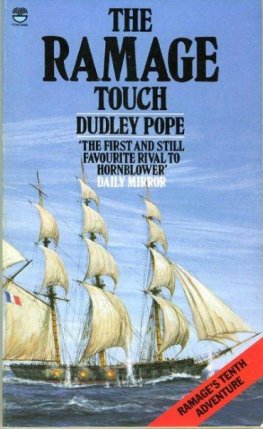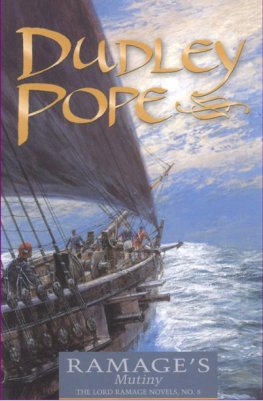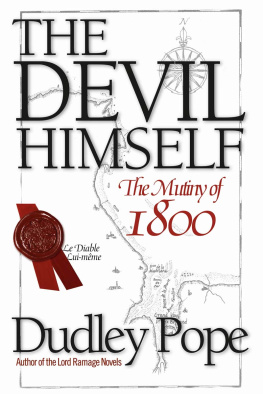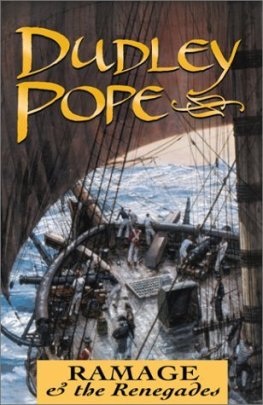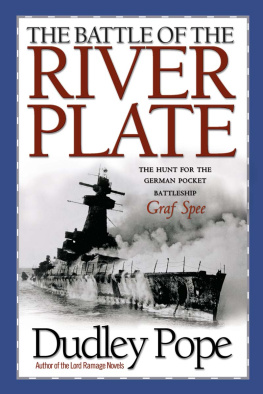For three friends -
Jane and Antonio
and Imek
Ramage felt dazed and grabbed at the thoughts rushing through his head: he guessed it was a nightmare, so he would soon wake up safely in his cabin; but for the moment his mind was apparently separated from his body, floating along free like a puff of smoke in the wind. All that noise sounded like continuous thunder and now he was beginning to wake up, hesitating and unwilling to open his eyes and slide from blissful and contented drowsiness into the sharp bright light of consciousness.
Yet he felt a vague uneasiness, wondering if he had overslept and would be late on watch. Uneasiness gave way to apprehension as slowly he realized the thunder was of gunfire: from an enemy's broadsides, punctuated by the occasional deep-chested, bronchitic cough of his own ship's 12-pounder cannons firing, followed by the familiar cartwheels-across-a-wooden-bridge rumble of the trucks as the carriages jerked back in recoil until they reached the limits of the thick rope breechings, which groaned under the strain of halting them.
Then, as his sense of smell returned and the acrid fumes of gun smoke burnt the back of his nostrils, he realized
'Mr Ramage, sir!... Mr Ramage, sir!'
It was his name, but they were shouting from a long way off, reminding him of his childhood when he had gone over the fields and into the woods and one of the servants called him back for a meal. 'Master Nicholas,' they'd shout, 'you come this minute; 'is Lordship's terrible angry when you're late.' But Father was never angry; in fact
'Mr Ramage! Mr Ramage - wake up, sir I'
But that isn't a servant's voice - there's no Cornish burr: it's a boy calling - a frightened and almost hysterical boy with a sharp cockney accent.
'Mr Ramage - ohmygawd do wake up, sir!'
Now a man's voice joined in, and they began shaking him as well. Heavens, his head hurt: he felt as if he had been bludgeoned. The enormous grunt and rumbling interrupting them must be another 12-pounder going off close by and slamming back in recoil.
Ramage opened his eyes. His body still seemed remote and he was startled to find himself lying with his face pressed against the deck. The pattern on the planking was really most extraordinary. He noticed - as if seeing it for the first time that constant scrubbing and holystoning with sand and water had worn away little alleys of soft wood between the harder ridges of the grain. And someone must swab up the blood.
Blood staining the scrubbed planks: the words forming in his mind shocked him into realizing he was now conscious, but still curiously detached, as if looking down from the masthead at his own body sprawled flat on its face between two guns, nose pressed against the deck, arms and legs flung out, like a rag doll on a rubbish heap.
They shook him violently and then rolled him over.
'Come on, sor ... come, Mr Ramage, wake up!'
He opened his eyes reluctantly but his head spun for several moments before he could see their faces, and even then they were distant, as though viewed through the wrong end of a telescope. Finally, by concentrating hard he managed to focus the boy's face more clearly.
'Yes?'
God, was that his voice - a rasping croak like a holystone being dragged across a dry deck?
'Yes - what's the matter?'
The effort of speaking brought Ramage's memory back with a rush: it was a stupid question: everything was the matter when late one sunny September afternoon in the year of Our Lord 1796 a French 74-gun line-of-battle ship, the Barras, trapped His Majesty's frigate Sibella, of 28 guns....
'Ohmygawdsir, it's awful,' gabbled the boy. 'All dead they are, sir, an' a shot caught the Captain right'
'Steady boy: who sent you?'
'Bosun, sir - said to tell you you was in command now, sir: everyone else's killed and the Carpenter's Mate says there's four feet o'water in the well and the pumps smashed, sir -can't you come on deck, sir? 'Ere, I'll 'elp you,' he added pleadingly.
The urgent, terrified note in the boy's voice and the phrase 'You was in command now, sir" helped clear Ramage's head (which was beginning to throb in time with the pumping of his heart) but the significance was chilling. Every junior lieutenant dreamed of commanding a frigate in action; but that terrible rumbling a few hundred yards away - as though some giant god of mythology was hurling bolts of lightning through the frigate's hull, butchering men and timber alike - was the French line-of-battle ship firing her broadside, some 35 heavy guns. The spasmodic coughs and grunts close by were obviously all that remained of the frigate's puny broadside of 14 light guns.
No, that was not included in a junior lieutenant's dream of glory; nor was having the command thrust upon him when most of his wits had been scattered by a blow on the head and so far refused to return. Still, this deck was deuced comfortable ...
'Come on, sor: I'll 'elp you up.'
Ramage opened his eyes again and, as he recognized one of the seamen - a fellow Cornishman named Higgins, or Briggins, or some such name - realized he had been slithering back into sleep or unconsciousness, or whatever it was that drained the strength from his body and befogged his brain.
Higgins - or was it Briggins? Oh, it didn't matter - stank of sweat: cloying yet sharp, but it did not burn the nostrils like smoke from the guns. As they hoisted him to his feet Ramage closed his eyes to stop his head spinning, and he heard Higgins or Briggins roundly cursing another seaman: 'Wrop his bloddy arm round yor bloddy neck, else 'e'll fall down. Now hold his wrist. That's it. Now walk 'im, you heathen Patlander!'
Ramage's legs flopped one in front of the other while the Cornishman on one side and the Irishman on the other dragged him along: they probably had plenty of experience of getting a drunken shipmate out of a tavern.
In front, through the smoke swirling across the decks and curling into strange wreathing patterns as it was caught by eddies of wind coming in at the gun ports, danced the boy, whom he now recognized as the First Lieutenant's servant. The late First Lieutenant's servant, he corrected himself.
What the 'ell now? 'Ow are we ter get 'im up the ladder?'
The ladder from the main deck up to the gangway and quarter-deck has eight rungs - Ramage was pleased with himself for remembering that and is only wide enough for one man. Eight rungs mean nine steps to the top, and every one of those eight rungs is mine to command.
The stupidity of the thought shocked Ramage into realizing he was making no real effort to pull himself together: the two seamen could carry him no farther: he was on his own: up those eight rungs was the quarter-deck where, as the new commanding officer, he now belonged: where several score men were looking to him as their leader.
'Where's a tub?' he asked, freeing himself from the men's grasp.
'Just here, sor.'
He lurched a couple of paces and knelt beside it. When the ship beat to quarters before the action began, small tubs of water had been placed near the guns for the men to soak the sponges used to swab the barrels of the guns. As he plunged his head into the water he gave a gasp of pain, and groping fingers found a big swelling and a long gash across the back of his scalp. The gash was not deep, but enough to explain why he had been unconscious: probably a flying splinter of wood.
Ducking his head again, he swilled water round in his mouth, and spat it out, then pulled the wet hair back from his forehead, took several deep breaths, and stood up. The sudden movement set his head spinning again but already he felt stronger; the muscles were coming back to his legs.


